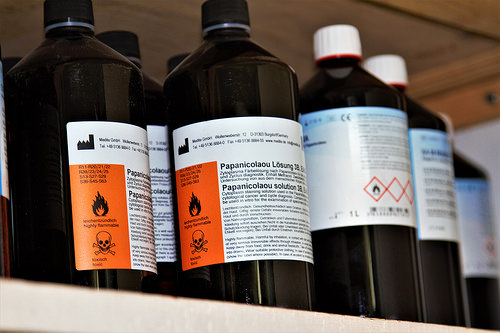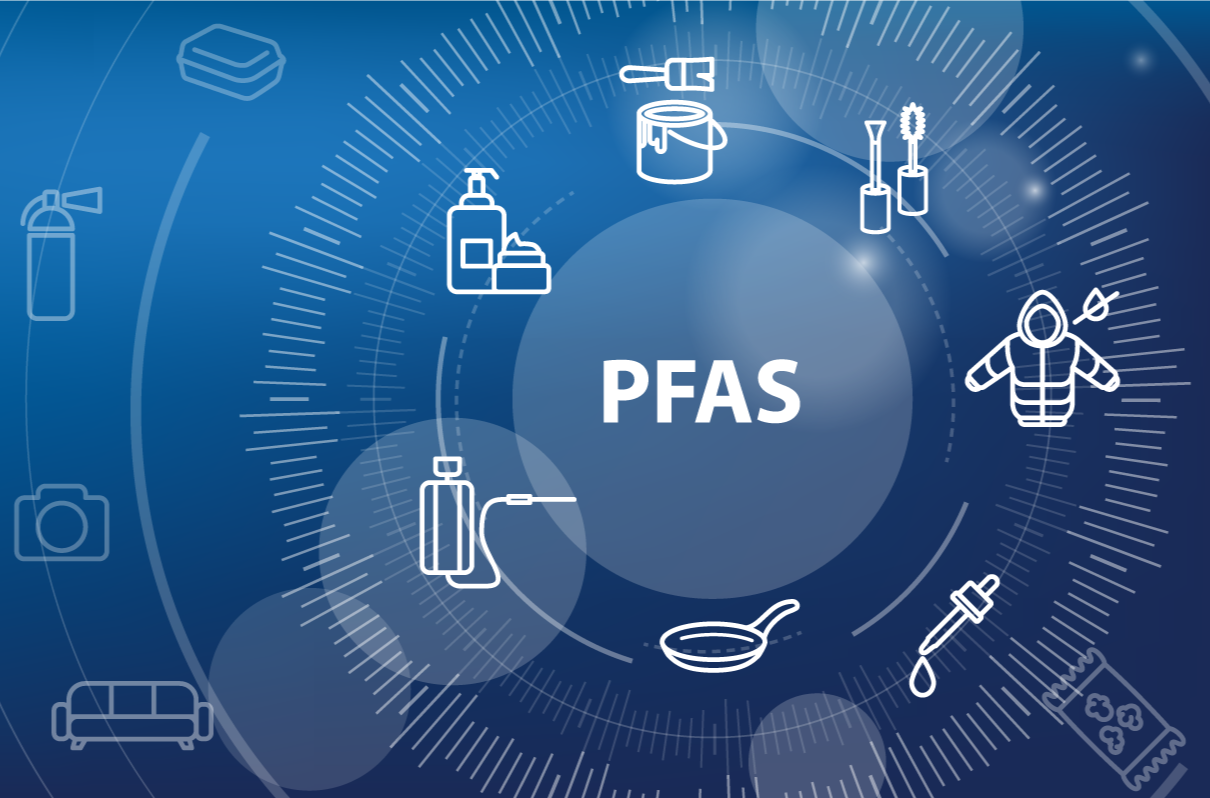Radon gas is released naturally by radioactive decay within rock formations, from where it can percolate to the surface and infiltrate basement and trenching, and then produce hazardous concentrations if trapped or spread throughout the structure by the ventilation system. Because of its radioactive origin, radon can pose health risks – it’s the leading cause of lung cancer in non-smokers. The US Environmental Protection Agency (EPA) administers extensive information programs, which encourage in-building testing (especially in housing), and provides guidance for hazard reduction. EPA’s authority derives primarily from the Indoor Radon Abatement Act of 1988 (codified as Title III of the Toxic Substances Control Act (TSCA)). In addition, the Occupational Safety and Health Administration (OSHA) considers radon a type of ionizing radiation subject to worker protection requirements. The remainder of this note provides background to radon hazards and their management, referencing information from EPA, OSHA and other agencies and professional organizations.
Read MoreAudit, Compliance and Risk Blog
Tags: OSHA, Environmental risks, Environmental, EPA, workplace safety, Environment, Environmental Policy, Hazardous Chemicals
California revises greenhouse gas emission and financial risk reporting laws
Posted by Jon Elliott on Tue, Nov 12, 2024
On September 27, 2024, California’s governor Gavin Newsom signed Senate Bill (SB) 219, amending greenhouse gas (GHG) emission reporting requirements for targeted organizations doing business in the state, enacted in 2023 (SB 253 (Wiener) (Climate Corporate Data Accountability Act) and SB 261 (Stern)) and initially scheduled to require compliance beginning January 1, 2025. (I wrote about them HERE) SB 219 revises and delays emissions reporting requirements. The revised requirements will still be administered by the California Air Resources Board (ARB), expanding its longstanding air quality and climate authority (GHG provisions center on the Global Warming Solutions Act of 2006 ((AB 32)). The remainder of this note discusses the revisions made by SB 219.
Read More
Tags: California Legislation, Environmental risks, Environmental, Greenhouse Gas, Environmental Projects, California, Environment, Environmental Policy
EPA issues Herbicide Strategy to protect endangered species from pesticides
Posted by Jon Elliott on Fri, Nov 01, 2024
In recent years, the US Environmental Protection Agency (EPA) has reviewed its overlapping responsibilities to regulate pesticides under the Federal Insecticide, Fungicide and Rodenticide Act (FIFRA), and to protect endangered and threatened species under the Endangered Species Act (ESA). In August, EPA completed its latest step in these efforts by issuing its “Herbicide Strategy to Reduce Exposure of Federally Listed Endangered and Threatened Species and Designated Critical Habitats from the Use of Conventional Agricultural Herbicides” (Herbicide Strategy). The rest of this note summarizes the Herbicide Strategy, and provides context regarding EPA’s FIFRA and ESA authorities.
Read MoreTags: Environmental risks, Environmental, EPA, Environmental Projects, Environment, Environmental Policy, environmental protection
Agencies provide hurricane preparation and response guidance
Posted by Jon Elliott on Fri, Oct 25, 2024
In October, the US Occupational Safety and Health Administration (OSHA) and other federal agencies reacted to hurricanes in the Southeast by re-highlighting existing guidance to support preparation for potential hurricanes, and to respond if one occurs. OSHA’s guidance is directed at employers, the National Oceanic and Atmospheric Administration (NOAA) and the Environmental Protection Agency (EPA) provide more generalized guidance, and the Centers for Disease Control and Prevention (CDC) target families. The rest of this note summarizes this timely information, centering on OSHA’s offerings.
Read MoreTags: Health & Safety, OSHA, Environmental risks, Environmental, Environment, Weather, weather safety, hurricane
Environmental issues in the party platforms for the 2024 US election
Posted by Jon Elliott on Mon, Sep 30, 2024
As the 2024 Presidential election enters its final stages, both major parties have published their election platforms. The Democrats have published a total of 91 pages covering all their promises, and the Republicans have published 16 pages. In 2020, the Democrats also published 91 pages, while the Republicans instead adopted a resolution promising continuity with ongoing Trump administration priorities (I wrote about the 2020 pronouncements HERE ). The remainder of this note summarizes the environmental elements in both parties’ 2024 platforms. Both documents conform to the parties’ general priorities, with the Democrats emphasizing continuing and expanding environmental policies of the most recent years while the Republicans promise to reduce regulatory burdens in line with returning to the policies of their most recent administration.
Read More
Tags: Environmental, Environment, environmental law, environmental protection, USA
Canada has just imposed restrictions against false or misleading statements made in marketing or other materials regarding the environmental impacts and benefits of goods and services -- “greenwashing.” These provisions were adopted as amendments to the Competition Act, enacted as part of the Government’s omnibus “Fall Economic Statement Implementation Act, 2023” (Bill C-59), which received royal Assent on June 20.
Read MoreTags: Environmental risks, Environmental, Environmental Projects, Environment, Environmental Policy
In July, the US Environmental Protection Agency (EPA) issued the fifth edition of its periodic Climate Change Indicators report, focusing on Indicators related to the human health and societal impacts of climate change. While this 96-page report provides broad policy discussions, it applies data which calibrate ongoing changes that organizations can use to support evaluations of the possible impacts of these changes on their ongoing activities and future prospects. The remainder of this note summarizes EPA’s latest indicators, and how they can be relevant to organizational planning and decision-making.
Read MoreTags: Environmental, EPA, climate change, Environment, Environmental Policy, Climate, environmental protection
EPA proposes TSCA review of five potential high hazardous substances
Posted by Jon Elliott on Fri, Aug 16, 2024
The 2016 amendments to the Toxic Substances Control Act (TSCA) added procedures for the Environmental Protection Agency (EPA) to evaluate risks presented by existing chemicals using the latest scientific information – including information developed after a chemical entered use in the US. Based on these reviews, EPA is to update its regulatory requirements, ranging from labeling-only through use restrictions up to and including bans from further distribution and use. (I summarized these review requirements HERE ). Beginning in November 2019, EPA regularly announces new chemical reviews, and subsequently the results of these reviews. (I wrote about the first review announcement HERE ). On July 25, 2024 EPA published a formal proposal to review 5 additional chemicals for designation as High-Priority Substance subject to strict controls under TSCA. The rest of this note identifies these proposed chemicals.
Read MoreTags: Health & Safety, Environmental risks, Environmental, EPA, tsca, Hazardous Waste, Environment, Hazardous Chemicals, Hazardous Material
In June, the US Occupational Safety and Health Administration (OSHA) and other federal agencies reacted to flooding in Florida by re-highlighting existing guidance to support preparation for potential flooding this summer, and to respond when it occurs. OSHA’s guidance is directed at employers, while the National Weather Service (NWS) provides more generalized guidance and the Centers for Disease Control and Prevention (CDC) target families. The rest of this note summarizes this timely information, centering on OSHA’s offerings.
Read MoreTags: OSHA, Environmental risks, Environmental, CDC, Environment, Environmental Policy, NWS
EPA designates two perfluoro “forever chemicals” as Superfund hazardous substances
Posted by Jon Elliott on Mon, Jul 01, 2024
On May 8, 2024, the Environmental Protection Agency (EPA) published rule revisions adding two perfluoro chemicals -- Perfluorooctanoic Acid (PFOA) and Perfluorooctanesulfonic Acid (PFOS) – as hazardous substances under the federal Superfund law (Comprehensive Environmental Response, Compensation, and Liability Act (CERCLA)). This listing is the latest regulatory action by EPA tightening controls on per- and poly-fluoroalkyl substances (PFAs); the initiatives are covered under the agency’s “PFAs Strategic Roadmap: EPA’s Commitments to Action 2021—2024,” promulgated in October 2021. The remainder of this note describes the latest action, which finalizes a proposal issued in August 2021 (which I wrote about HERE).
Read MoreTags: Environmental risks, Environmental, EPA, chemical safety, CERCLA, Environment, PFAS, PFOS










